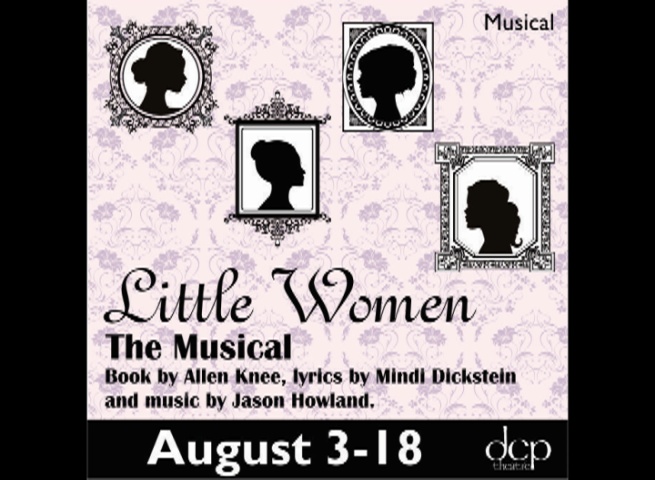"Little Women: The Musical" is the sprawling tale of the March sisters of Concord, Mass., immediately before and after the Civil War that tore a family's men from their wives' and daughters' arms as ruthlessly as it frayed the apron strings of love between the sisters and mothers left behind.
It was a time not entirely unlike our own, when pervasive misogyny smothered women's dreams, sentencing them by their gender to a kind of cultural house arrest and stunting their higher aspirations.
Jo March, the saga's heart and hope, will have none of it.
She wills herself into an independent force, remains steadfast in her conceits, and, by show's end, attains her lofty goals.
With "Little Women: The Musical", DCP continues its now sixty years' tradition of creating thoroughly engaging and feverishly family-friendly entertainment in a homey, secular cathedral in Telford, Pa.

The play is adapted from Louisa May Alcott's classic book that emerged in the aftermath of the War Between the States and follows her own early years nearly enough to be considered semi-autobiographical.
Jo March wants to write and to be published. That's not what women were expected to do in those days. But, Jo's not to be deterred! (I think that covers it).
Under the light directorial wand of David Williams and the truly inventive and almost giddy choreography of the gifted Sarah Thomas, a dogged cast of twenty-four enviably young and nimble men and women create a mural six years in length and as wide as the friendly and accommodating DCP stage floor.
The play runs a solid 2 1/2 hours, but plays far shorter.
It's a musical, which means I'm completely the wrong person to speak to its tuneful merits.
I can tell you only that orchestrations in this production are pre-recorded; that the singers and dancers convince you otherwise, as if the orchestra sits just behind an upstage masking flat; and the song-list is both blessedly modest in number and whimsically eclectic in genres.
The performances are solid and noteworthy, especially given the ages and inexperience of many of the determined cast members.
This is no knock on the youth that played this show; most of the world-weathered opening night audience looked as if they would happily trade their years--- and probably stage skills, too--- with the performers.
However, the DCP stage and community theater tradition require old-fashioned stagecraft. The players work at the behest of the technical staff in building set and hanging lights, etc.
And this isn't one of those theaters whose sweet voices are bolstered by an elaborate network of wireless microphones with those mouthpieces curling around the cheeks of their faces like some parasitic worm.
At DCP you project, or you vanish. These guys didn't vanish!
Megan Knorr masters a gigabyte of dialogue and a lengthy playlist of songs in her demanding role of the feisty and unconquerable Jo March.
I think the only job she's not asked to do on this stage is deliver a pizza, and there's nothing cheesy about the multitude of skills she does bring. She's convincing, endearing, and inspiring. Not bad for her DCP debut.
And David Fox, in an all-too-brief role as Jo's dedicated but somewhat indecisive suitor, Professor Bhaer, gives the show's wispy script some much needed backbone with the most engaging performance of the night.
Although his playing area is confined to a corner that would cramp a lesser man, the athletic and agile Fox expands and elevates the stage whenever the script permits him to appear.
And his interpretation and delivery of the play's greatest musical challenge, the Sondheim-esque "How Am I", is worth twice the price of admission and that white-knuckle drive to the DCP playhouse, which, by the way is thirty minutes from ANYWHERE.
All the members of the March family are charmingly rendered, by Isabella Carlo, Abby Witwer, Amanda Grace Wetzel, Madeline Burk, and, especially, the sweetly singing Nancy Server Thompson.
Katie Clemens as the imperious, but rich, Aunt March, who dangles the carrot of international travel in front of her culturally undernourished niece Jo, brings a strong and badly needed Stage Right presence to the play. That's not a small responsibility in a cast of 24.
Jared Lingle, Ray Thompson, Sam Levy, and an enthusiastic ensemble playing a variety of supporting roles give this show a depth the script itself seems not to have plumbed.
The director Williams and choreographer Thomas have devised several dance sequences that greatly color and strengthen the narrative of the play, including what appears to be an homage to the delightfully anachronistic "Golden Year's" carola in the film "A Knight's Tale".
I was never sure if this production was a spoof or simply a refreshingly irreverent presentation of what could otherwise have been a somewhat dreary playbook. The audience laughed heartily throughout the evening, though never AT the show--- never awkwardly as if some flaw had been detected--- but always at very funny line deliveries and after deftly timed pauses.
So, much credit is shared by the director and actors for execution and by the audience for paying attention.
The set by Caris Williams was striking and served its many purposes well, not least of which was providing backdrop to a considerable number of scene locations without disturbing the evening's flow, all supported by the attentive lighting design of Geoff Yaroschak.
And finally we must applaud Musical Director Ashlan McMichael whose elegant and flowing arm and hand never stopped coaxing the rhythm throughout a most happy evening.
"Little Women: The Musical" continues through August 18, 2018.
For information, visit www.dcptheatre.com or call (215) 234-0966.
"Little Women: The Musical"
Book by Allan Knee
Lyrics by Mindl DIckstein
Music by Jason Howland
